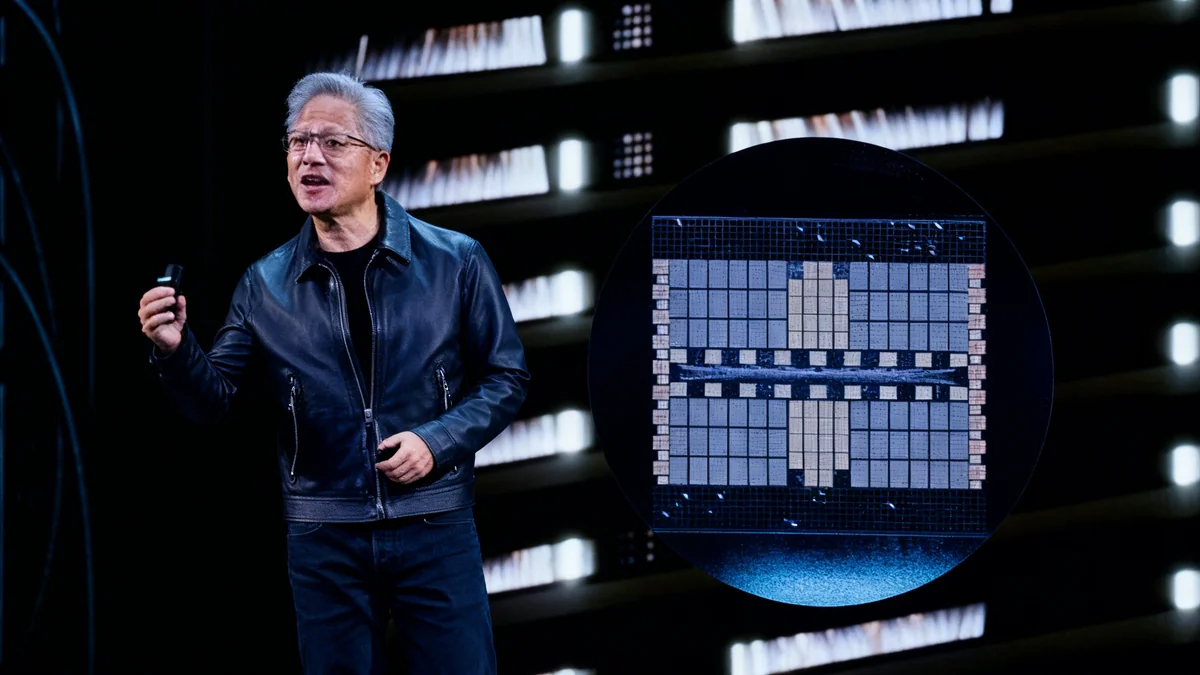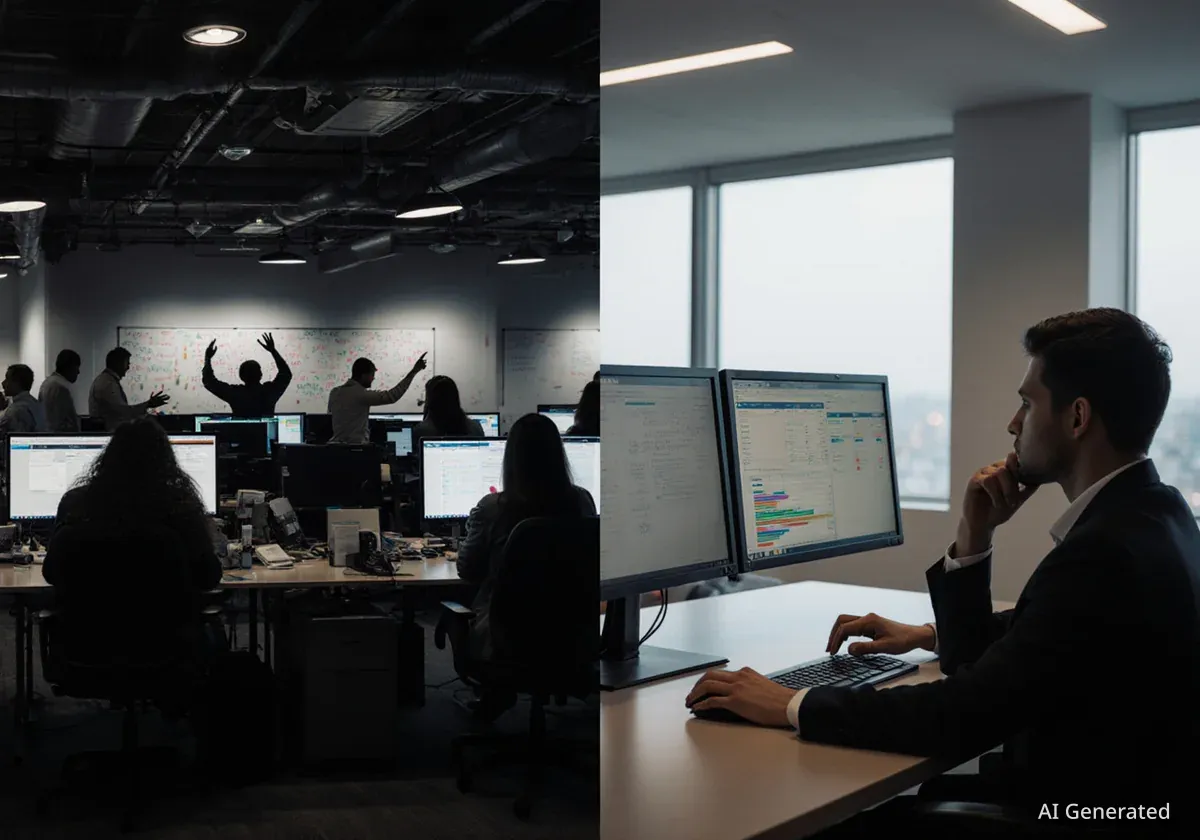Nvidia has secured U.S. government approval to export billions of dollars in artificial intelligence chips to the United Arab Emirates, a move that significantly expands its market presence in the Middle East. In a parallel development, Microsoft has announced the deployment of its first large-scale cluster of Nvidia's latest GB300 Blackwell GPUs on its Azure cloud platform, signaling a major upgrade in AI computing power for customers like OpenAI.
These two events highlight Nvidia's central role in the global AI infrastructure race. The export license to the UAE opens a critical new revenue stream, while the partnership with Microsoft solidifies the immediate commercial adoption of its next-generation Blackwell architecture, further cementing its market dominance.
Key Takeaways
- The U.S. government has granted Nvidia export licenses to sell AI chips to the United Arab Emirates.
- The deal, part of a U.S.-UAE AI pact, allows the UAE to import up to 500,000 Nvidia chips annually starting in 2025.
- Microsoft has deployed the world's first large-scale production cluster of Nvidia's GB300 NVL72 systems on its Azure cloud platform.
- The initial Microsoft cluster includes over 4,600 of Nvidia's new Blackwell Ultra GPUs, with plans to scale to hundreds of thousands.
- These developments are expected to significantly benefit OpenAI, a key partner for both Nvidia and Microsoft in developing large-scale AI models.
Nvidia's Strategic Expansion into the Middle East
The U.S. Commerce Department's Bureau of Industry and Security has officially granted Nvidia the necessary export licenses to supply the United Arab Emirates with its advanced AI processors. This decision is a direct outcome of the bilateral artificial intelligence agreement signed between the U.S. and the UAE in May.
The approval represents a significant geopolitical and commercial victory for Nvidia, allowing it to tap into the rapidly growing AI ambitions of Gulf nations. The UAE and neighboring Saudi Arabia are investing billions to establish themselves as leaders in the AI sector.
Details of the U.S.-UAE AI Agreement
The agreement provides a clear framework for the technology transfer. Starting in 2025, the UAE will be permitted to import as many as 500,000 Nvidia chips per year. These components are crucial for the construction of large-scale data centers designed to power next-generation AI applications.
In exchange for access to this critical technology, the UAE has committed to a substantial economic investment in the United States. The nation has pledged to invest up to $1.4 trillion in the U.S. economy over the next decade, fostering deeper economic ties between the two countries.
Abu Dhabi's AI Hub
A central component of the UAE's strategy is the development of a massive data center in Abu Dhabi. This facility is being built in close partnership with OpenAI, which will be a primary user of its computational resources. The project is designed to position the UAE as a key hub for AI development and research in the region.
For Nvidia, this deal not only opens a new, lucrative market but also reinforces its status as the premier supplier for sovereign AI initiatives worldwide. As nations increasingly view AI capabilities as a matter of strategic importance, Nvidia's hardware remains the foundational element for building this capacity.
Microsoft Deploys Nvidia's Next-Generation Blackwell GPUs
In a separate but equally important development, Microsoft has become the first major cloud provider to deploy Nvidia's new GB300 NVL72 systems at scale. The initial cluster, now operational on the Microsoft Azure cloud platform, marks the commercial debut of the much-anticipated Blackwell architecture.
This first deployment is substantial, comprising over 4,600 Nvidia Blackwell Ultra GPUs. The entire system is interconnected using Nvidia's high-speed Quantum-X800 InfiniBand networking, which is designed to allow the massive cluster of GPUs to function as a single, powerful supercomputer.
Unprecedented Scale and Power
Each virtual machine within this new Azure cluster can access 37 terabytes of high-speed memory and delivers 1.44 exaflops of AI performance. This level of power is specifically engineered for the immense computational demands of training and running AI models with trillions of parameters.
A Glimpse into the Future of AI Infrastructure
Microsoft CEO Satya Nadella confirmed that this initial deployment is just the beginning. In a statement on the social media platform X, Nadella revealed that the company has ambitious plans to scale its infrastructure to include hundreds of thousands of Blackwell chips. This massive expansion will involve upgrading every layer of Microsoft's technology stack to support the next wave of AI innovation.
"This provides the supercomputing power OpenAI needs to run massive AI models with trillions of parameters," said Ian Buck, Nvidia’s Vice President of Hyperscale and High-performance Computing. He described the Microsoft deployment as the world's first large-scale GB300 production cluster.
Nidhi Chappell of Microsoft elaborated on the collaboration, stating that it will enable partners like OpenAI to deploy advanced AI infrastructure more rapidly than ever before. The tight integration between Nvidia's hardware and Microsoft's cloud services is intended to accelerate the development of more complex and capable AI systems.
Financial Implications and Market Outlook
These strategic moves have significant financial implications for both Nvidia and Microsoft, reinforcing their dominant positions in the AI industry. The market has reacted positively to the news, with Nvidia's stock showing gains in premarket trading following the UAE announcement.
Investment in AI's Future
The scale of investment in AI infrastructure is staggering. Last month, Nvidia announced plans to invest up to $100 billion in OpenAI to help construct at least 10 gigawatts of AI data center capacity, all powered by its technology. This underscores Nvidia's strategy of not just selling chips but also investing directly in the ecosystem that drives demand for them.
Microsoft is also escalating its capital expenditures. The company spent $88.7 billion on data centers in Fiscal 2025 and has projected an additional $30 billion investment for the first quarter of Fiscal 2026. This represents a 50% increase compared to the same period in the previous year, highlighting the aggressive pace of its infrastructure build-out.
Analyst Ratings and Stock Performance
Wall Street analysts maintain a positive outlook on both companies. The developments are likely to lead to upward revisions of earnings forecasts and price targets.
- Nvidia (NVDA): The stock holds a Strong Buy consensus rating, based on 35 Buy ratings, two Holds, and one Sell. The average price target of $213.61 suggests a potential upside of 13.1%. Year-to-date, NVDA shares have already surged by nearly 41%.
- Microsoft (MSFT): Analysts have assigned a Strong Buy consensus rating to the stock, with 33 Buy ratings and one Hold. The average price target of $629.22 per share implies a potential upside of 21%.
The approval of the UAE chip sales and the successful deployment of Blackwell GPUs by a key partner like Microsoft provide strong validation for Nvidia's growth trajectory. As the demand for generative AI continues to accelerate, both companies are strategically positioned to capture a significant share of this expanding market.





